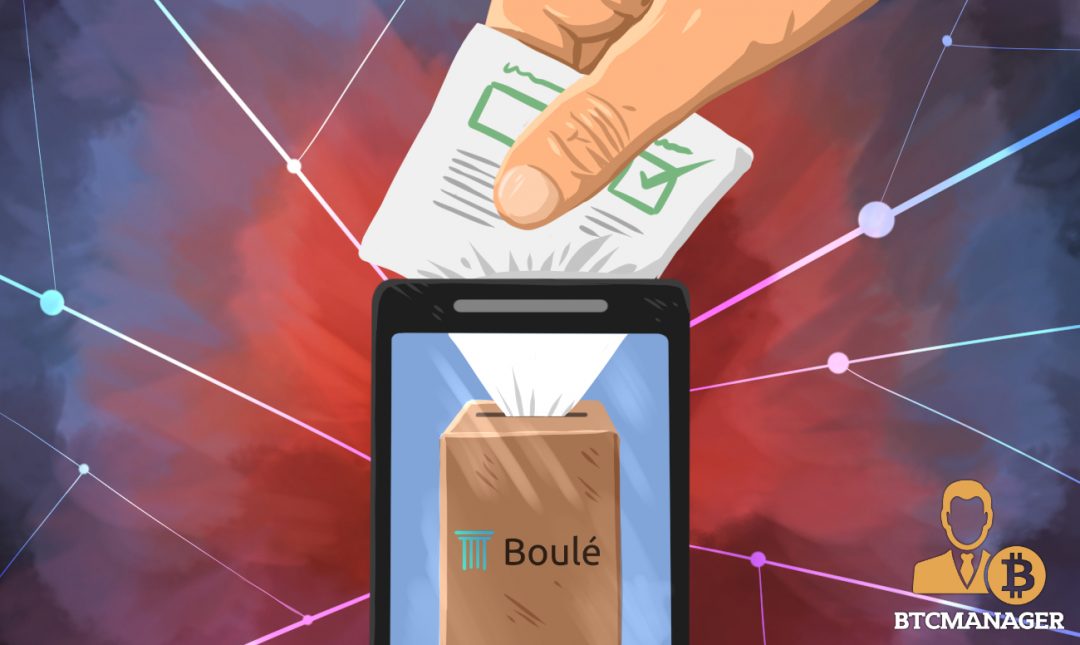Boulé Offers Ethereum Based E-Voting Platform

The team at Boulé are looking to combine blockchain technology and the voting experience in order to increase voter participation. Following the upcoming ICO, the group will test their services first with non-profit organizations, small communities and scholarly institutions. The BUO token will be on sale until the November 12 following a scale of decreasing bonuses up until the final day.
Remote Voting Technology
In ancient Greece, a boulé was one of the first forms of a directly elected group of officials. The group presided over naval, financial, administrative, and religious matters in their respective cities. The most notable boulé was in Athens, where officials were voted on by an allotment of voters. It was thus here that our modern conceptions of democracy were born.
The advent of internet and most recently, blockchain, poses other more interesting avenues for developing ancient Greek ideas. Moreover, our increased global mobility has also put expatriated citizens in a complicated situation when attempting to vote in their home country.
With already a handful of 21st century examples to base their projections on, Boulé is seeking to continue exploring the space of digitized voting. The ultimate goal is to improve voter turnout in order to create a more complete form of democracy. Not only that, but the voting process will ultimately be rendered cheaper and more efficient if it is moved to the digital sphere.
Historic Examples of E-Voting
In 2009, Estonia employed internet voting for their local municipal elections with over 104,000 individuals participating. This number reached 140,846 in the case of the 2011 parliamentary elections. It should be noted that at least 4% of these votes were also cast by Estonian citizens living abroad. In more recent parliamentary elections in the country, 31.1% of all voters voted via digital means, thus making clear that the their is a great interest and convenience in the internet voting platform.
In France, results were quite similar. In 2003, French citizens living abroad were given the opportunity to vote online for their representatives of the Assembly of French Citizens Abroad. Later, in 2007, the Union for a Popular Movement (UMP) used both remote electronic voting systems and traditional polling stations. The vote ended with a 70% turnout and a total of 230,000 votes tallied.
From these examples, it becomes very clear that their is a real functionality for citizens to use online voting. Not only will it increase voter turnout in domestic affairs, but citizens living abroad will be able to participate in elections that would affect friends and family at home.
Blockchain Voting
The greatest threat to these systems, especially when moving internet voting platforms to a national level, is security. According to Boulé, “several security protocols have to be activated to ensure the [inviolability] of the voting system.” These measures of security are ensured in a few ways. First, they will use biometric recognition access. After facial recognition confirms the identity of the voter, the voter must then enter a personally encrypted password.
Throughout this verification process, national officials will be working with individuals inorder to ensure that encrypted transactions belong to the owners of the vote. Specifically, a nation would give recognition numbers wrought from ID cards, residential codes, and other means of traditional verification.
In order to avoid digital and paper double counts, Boulé will employ the same voting strategies used by the Estonian government. During elections, voters will be able to vote for a series of days, but will be excluded from digital voting up to four days before election day.
Community Support
As their white paper frequently suggests, the company is looking for an open-platform discussion from members of its presale. This means that more ideas can be developed, proposed, or even eliminated from the proposed strategy. Just as Boulé hopes to improve the quality of democracy, they also hope to develop their own blueprints democratically.
The project seeks to be working on national elections by 2020 and the token sale to take place later this year. Specifically, the token amount will be capped at 300 ether, as it is also the minimum needed to lance the project.












